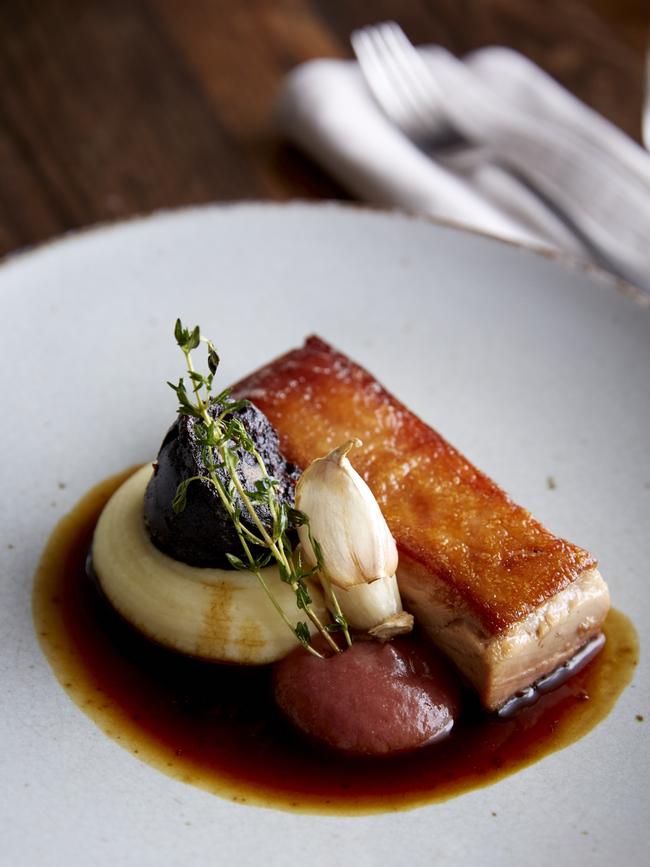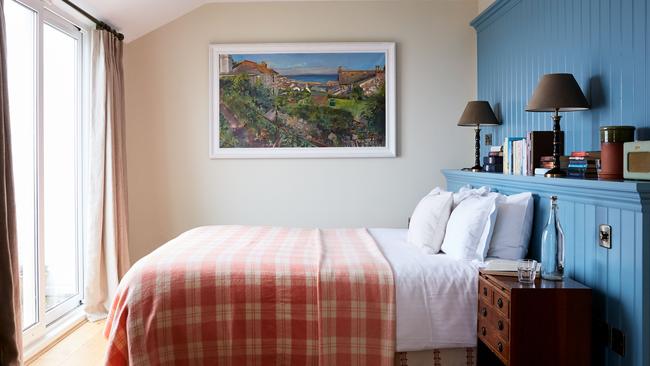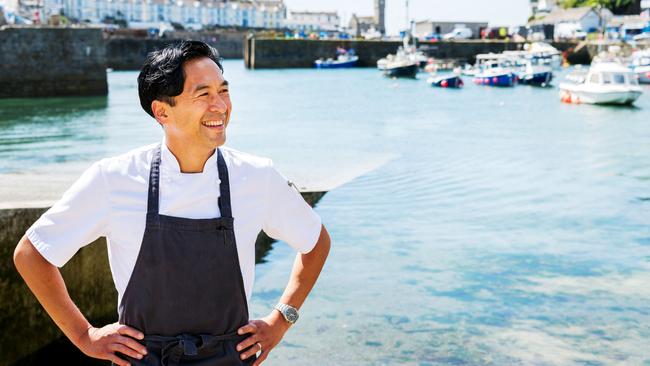Cornwall’s food scene is worth the long-haul flight
In this tiny corner of England’s southwest, the restaurant scene is on fire with new Michelin-starred venues, a sustainability focus and influx of Australian chefs.

In England’s southwest is a land of pristine beaches, fishing villages and ancient standing stones. Beyond the sea mist-shrouded moors is a thriving culinary scene grounded in a history of slow farming, small-batch food production and low-impact livestock. A popular destination for international food-trail travellers, Cornwall first emerged from the culinary shadows when Rick Stein, the grandaddy of celebrity chefs, opened his Padstow bistro in 1975.
His cooking was so good and his personality so affable he created a $60m global empire that spread to Australia. British power chefs Nathan Outlaw, Paul Ainsworth and Emily Scott followed him to Cornwall, opened namesake restaurants and the Michelin stars started dropping.
An influx of new talent has spiked more interest in the region, with a handful of Antipodeans putting their distinctive stamp on the scene. One is Australian chef Michael Smith, who has converted a sleepy beachfront cafe in St Ives into a celebrated seafood eatery called Porthminster Beach Cafe and serving dishes inspired by pan-Asian Australian cuisine. Fish is fresh daily and much of the produce comes from the garden behind the diner. A beach barbecue is used to cook fish and meat, served with salad. The venue also has a gin and cocktail bar with a sun deck.
“This year I see the food trend as being pared back with simple ingredients and less fluff,” says Smith. “It’s big flavours with minimal intervention. I don’t want silly terms for food. If I don’t know what it is, it has to go.”
British chef/grower Dan Cox recently received a red Michelin star (for high-quality cooking) plus a green sustainability Michelin star for his one-year-old debut restaurant Crocadon in St Mellion, North Cornwall. Cox’s obsession with soil and food integrity began while working with hero chef Simon Rogan and led him into farming in Cornwall six years ago. His mix of biodynamic and organic principles produces full-circle farming to feed his restaurant and bakery. Cox also makes the restaurant ceramics using animal parts. “I use sheep bones and the crab shells to burn down to make the glazes for the ceramics,” he says.
On the menu are wild garlic, cucumber and sheep-shoulder dumplings; snowball cauliflowers, hen of the wood mushrooms and sea lettuce; roe deer, juniper, salted plum, carlin pea and shiso, which has prompted peak discussion among Cornwall’s culinary crowd.
Another Cornwall newcomer is chef Hylton Espey, who opened Culture in Falmouth in 2022. His simple tasting menu features foraged, pickled, preserved, powdered and primarily local food. He travels a maximum 90 minutes to source produce, and gathers seaweed, pennywort, three-cornered garlic and chickweed daily around Falmouth.


“When mushrooms are abundant, I preserve them in every way imaginable. I just will not compromise the quality of the ingredient,” Hylton says.
Food waste is used on a molecular level, with offcuts turned into crackling and garnishes. “I take a venison tendon from the stock pot, dehydrate it, then fry it to create a puff texture. We do the same with fish skin – it’s a three-day process,” he explains.
Culture’s menu is seasonal; main courses might have two ingredients such as fish or game with celeriac or hispi cabbage. Sauces are made from offal and offcuts, which are dried and grated over meat cooked on the braai, a South African barbecue that is front and centre of Culture’s kitchen. “We cook all meats on the braai, so it’s flavoured by the smoke from the hot embers,” he says. This is an omnivore and pescatarian destination only. They say their dishes are “designed for pleasure and cannot be altered to suit dietary requirements”.
Culture has replaced the amuse-bouche with “snacks”, a move that is trending on upscale menus across Britain. Culture’s iterations include a lightly cured red gurnard with foraged rock samphire; brown crab butter crumpets with preserved wild garlic; savoury churros with cured cheese and three-cornered leek powder. Bread made from home-milled heritage Red Devon wheat is served with local butter that Hylton smokes. His dedication has paid off, with Michelin awarding the restaurant a green star for sustainability in 2023.
Snacks are spectacular at exceptional fine-dining restaurant Ugly Butterfly by Adam Handling, which opened in 2021. Set in the 10ha of gardens and beachfront of the 19th-century Carbis Bay Hotel near St Ives, the restaurant’s ethos focuses on sustainability and zero waste. Snacks include delicacies such as a tiny pea tart of umami bliss with salty egg custard and mushroom ragu, while a black lotus flower-shaped waffle piped with smoked fish delivers a creamy, salty crunch.

The dishes speak of culinary genius rather than discarded food stuff. The vegan tasting menu keeps perfect pace with the omnivore version, revealing a kitchen that takes culinary pleasure seriously. Happily for Cornwall, Handling opened The Tartan Fox pub near Newquay this month. It has a country cuisine code, sustainability policy and boutique accommodation.
Cornwall is not all locavore, foraged foods and fish. Country-style cooking reigns at The Gurnard’s Head in remote Zennor. Perfectly positioned on the 1013km South West Coast Path, it’s an excellent lunch stop for hikers. Dishes feature punchy North African spices, subtle Mediterranean flavours and classic Sunday roasts of beef and lamb. It’s hearty British food at its best, with local game from grand estates, Roscoff onions and “protected designation of origin” cheeses from across Britain. The bar has a fireplace for winter nights and a summer beer garden overlooking the ocean. Fat Hen wild food company collaborates with the pub and hosts a 2½ -hour foraging walk that ends at the pub, where the collected finds are transformed into a four-course feast.

Sister operation to The Gurnard’s Head is The Old Coastguard, a seafood dining experience in the sweetly named coastal village of Mousehole that offers dinner, bed and breakfast packages. Meals can be spread across both destinations, which have strikingly different landscapes of dramatic moors with wild ponies and rugged coast to the beautiful fishing village of Mousehole, where the poet Dylan Thomas called “the loveliest village in England”.
About 40 minutes’ drive up the coast from Mousehole is Porthleven, a low-key food hub and home to British TV chef New Zealander Jude Kereama. His restaurant, Kota, which means shellfish in Maori, has held its Michelin Bib Gourmand award for great value food for six years. The menu showcases sea and land with some inspired creations such as a Jerusalem artichoke, truffle ice cream sandwich in a choux pastry with black garlic caramel. The wine pairing explores New Zealand, France and Britain while the B&B upstairs has comfortable beds. Just along the harbourfront is Kereama’s more casual affair Kota Kai, which holds clues about the chef’s ancestry. Silver ferns decorate walls with Maori tribal motifs from the Tiko Tiko, the people of Kereama’s father. The menu is packed with laksa, crispy squid and bao buns.

“I’m known for my Asian flavours and that started when I was growing up in New Zealand,” he says. “My mum is Chinese Malay and had to use what was available back then to make Singapore sauces. With my dad, we used to get moss off the rocks and catch blue swimmer crabs that mum whacked into a pot. She would cover them in sauces and we’d eat it with white bread. Now I capture those flavour in my bao buns.”
Porthleven also has The Square, a French-style bistro that snagged a Michelin Bib Gourmand in 2023. It’s an unpretentious restaurant with classics such as moules-frites, duck and port pate, house-smoked salmon and shellfish in Provencal sauce.
If dining out every night becomes a chore, order an in-house barbecue with Perth native Adam Kesacoff, aka The Aussie Smoker. Kesacoff smokes his cheeses, pulled pork, beans and meats and is a hot ticket among visitors wanting to entertain at their holiday rentals. The Aussie Smoker team arrives with a barbecue pit and cooks up a buffet with meats, salads and desserts that could feature charred pineapple served with cinnamon and Cornish clotted cream.
“I’ve brought a little bit of Australia to Cornwall. The Brits love a good barbecue and I enjoy being the pitmaster and making it happen,” Kasacoff says.
If you love to travel, sign up to our free weekly Travel + Luxury newsletter here.

To join the conversation, please log in. Don't have an account? Register
Join the conversation, you are commenting as Logout